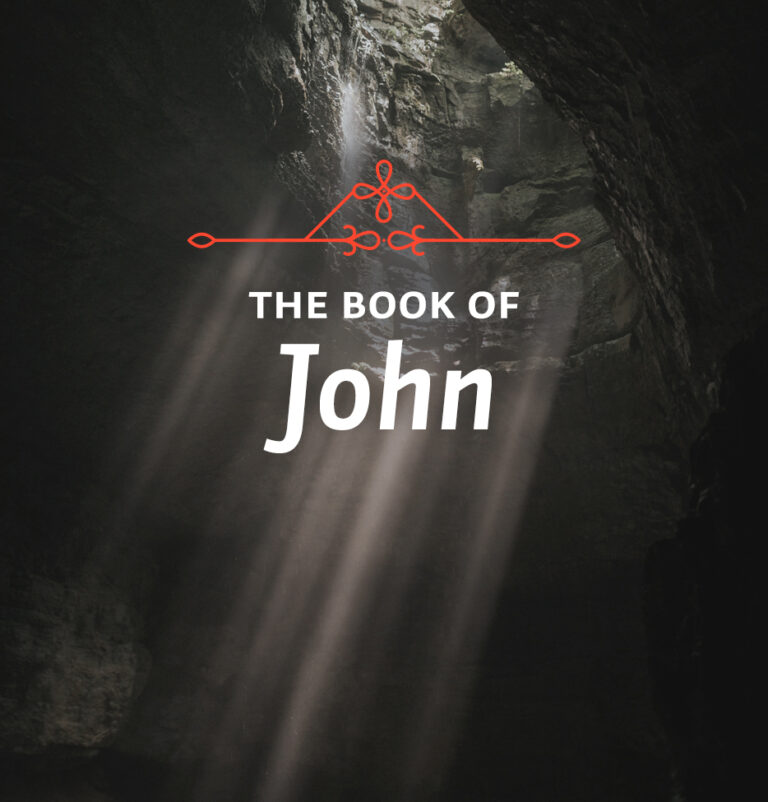
The Path of Service — Part One
The Path of ServiceJohn 13:13-17Theme: Foot-washing.This week’s lessons teach us how to encourage one another and share each other’s burdens. Lesson

The Path of ServiceJohn 13:13-17Theme: Foot-washing.This week’s lessons teach us how to encourage one another and share each other’s burdens. Lesson

The Path of ServiceJohn 13:13-17Theme: Foot-washing.This week’s lessons teach us how to encourage one another and share each other’s burdens. Lesson

The Path of ServiceJohn 13:13-17Theme: Foot-washing.This week’s lessons teach us how to encourage one another and share each other’s burdens. Lesson

The Path of ServiceJohn 13:13-17Theme: Foot-washing.This week’s lessons teach us how to encourage one another and share each other’s burdens. Lesson

The Path of ServiceJohn 13:13-17Theme: Foot-washing.This week’s lessons teach us how to encourage one another and share each other’s burdens. Lesson
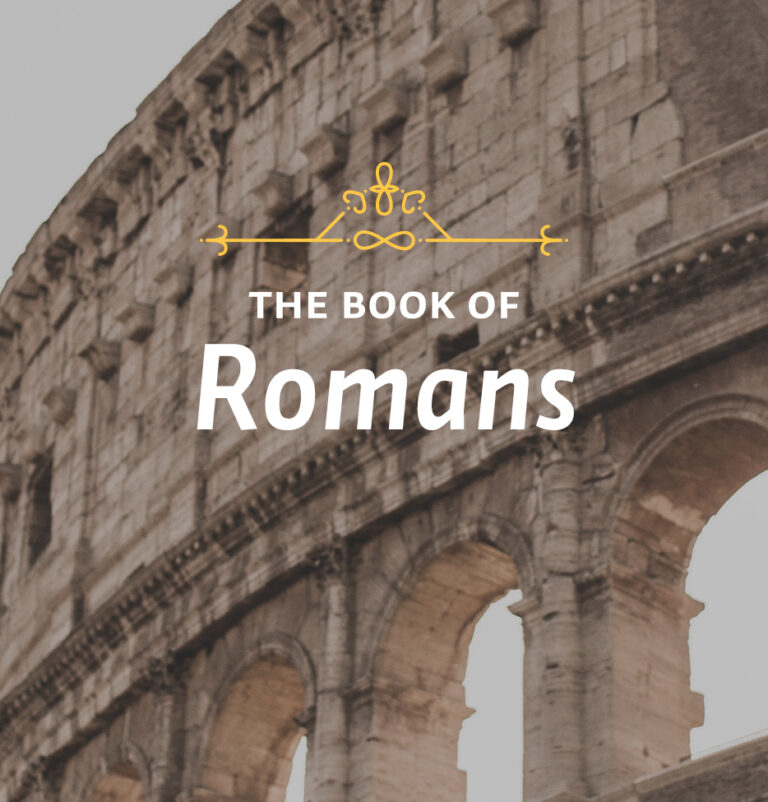
Service That Makes SenseRomans 12:1-2Theme: Reasonable sacrifices.This week’s lessons explore the reasons we should be eager to offer ourselves to God. Lesson

Service That Makes SenseRomans 12:1-2Theme: Reasonable sacrifices.This week’s lessons explore the reasons we should be eager to offer ourselves to God. Lesson

Service That Makes SenseRomans 12:1-2Theme: Reasonable sacrifices.This week’s lessons explore the reasons we should be eager to offer ourselves to God. Lesson

Service That Makes SenseRomans 12:1-2Theme: Reasonable sacrifices.This week’s lessons explore the reasons we should be eager to offer ourselves to God. Lesson

Service That Makes SenseRomans 12:1-2Theme: Reasonable sacrifices.This week’s lessons explore the reasons we should be eager to offer ourselves to God. Lesson
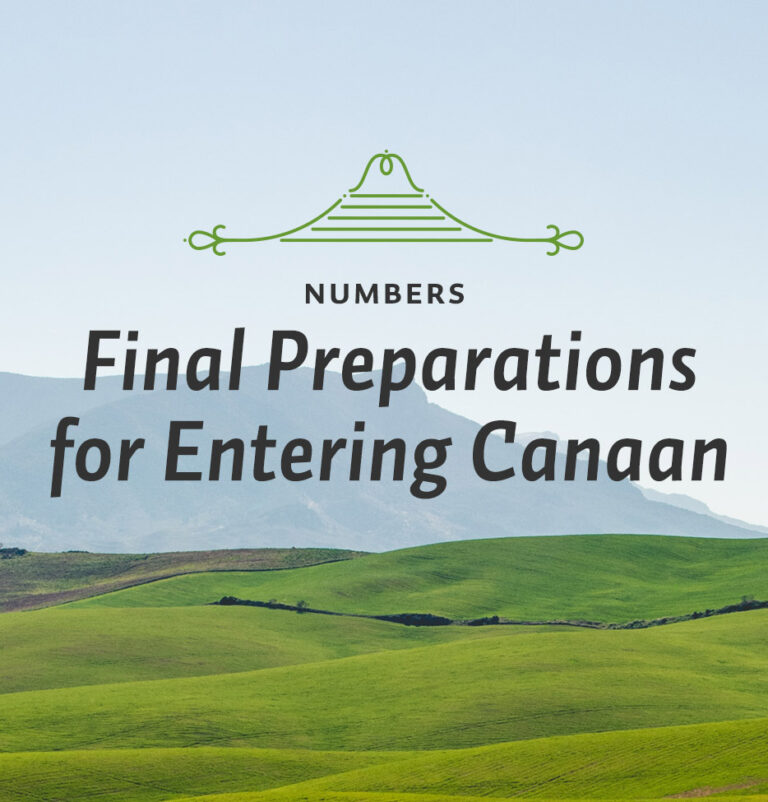
These cities of refuge are an illustration of how we find salvation in Jesus Christ. Now it is not a perfect illustration. This appointment of the cities of refuge was for people who were innocent of any real crime. We’re not innocent, we’re guilty of sin. Furthermore, although these cities were spaced throughout the land at convenient intervals, a person who had accidentally killed somebody else nevertheless had to scramble to get to one of them. They might be overtaken on the way. But salvation is never like that. We don’t have to scramble to find Jesus Christ. He is there with open arms, inviting us to come to Him. Not only that, but He actually pursues us. It’s not we who pursue Him. But even with these important differences, this illustration still makes some good points for us.
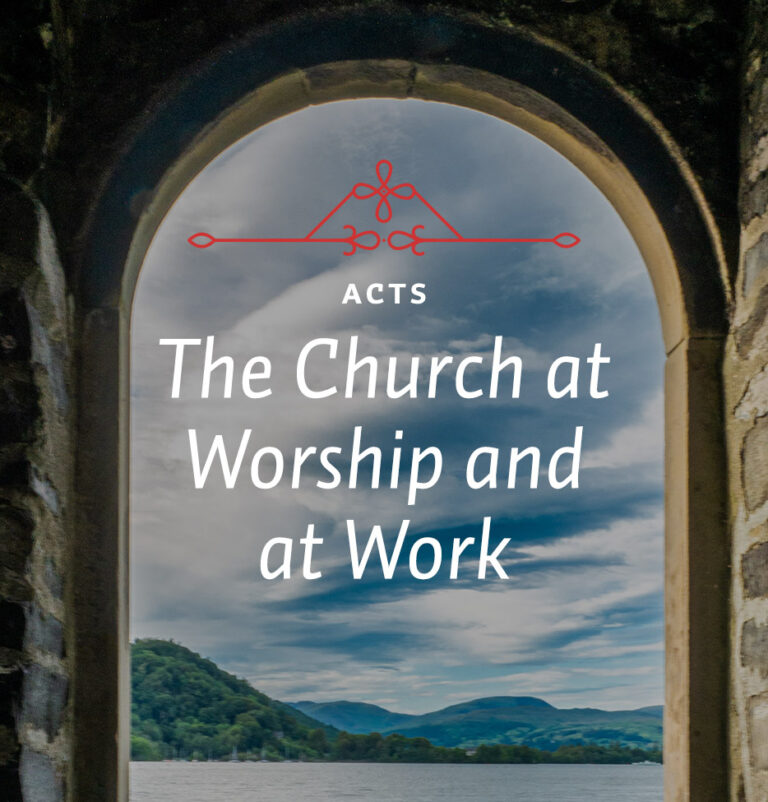
Do you enjoy getting missionary letters? In this age of voluminous and many times worthless communications, I suppose there are Christians who get missionary letters and simply throw them away, the way they throw away many worthless advertisements. But for my part, I enjoy missionary letters. I enjoy them because, by reading them, I feel that a window has been opened for me into Christian work in some other portion of the world, and I am interested in that. I am encouraged to learn what God is doing there.

When God’s people worship God, they always do two things: 1) they pray, and 2) they reflect on the Scriptures. Prayer is our talking to God; the Scriptures are God’s talking to us, and the two always go together. You pray in a right way when you pray scripturally. You study the Scriptures in a right way when you study prayerfully. This is what the church was doing. They had been reflecting on the Scriptures. Now, as they began to pray, the Scriptures, as it were, rose up in them, and they found themselves talking to God in God’s own words, the words of Scripture.

The minds of these early Christians were being scripturally transformed, because, although in a certain sense, being devout Jews, they already knew the Scriptures, before this they had not understood them. They had read the Old Testament. They had heard it in the synagogues. I am sure they had even memorized important passages. But they did not really understand them. It was only after Jesus died and had risen again and the Holy Spirit had come, that their eyes were opened and they saw the Old Testament in its true light.

The verses that came to the minds of the Christians in this important worship service were from Psalm 2. Psalm 2 is a great Messianic psalm, but this is the first time its words have appeared in Acts. The psalm is a record of human rebellion against God and God’s response to it, but it is the verses dealing with the rebellion itself that they cite: “Why do the nations rage and the peoples plot in vain? The kings of the earth take their stand and the rulers gather together against the Lord and against his anointed One” (Acts 4:25-26).

We come then to the second half of this last section of Acts 4, and here we see a vignette reflecting on the life and work of the church in those days. It was a bit like living in Eden. True, the church was composed of sinful people. We are going to see a pair of them in the very next chapter. But still it was a glorious time. We are told three things about them.
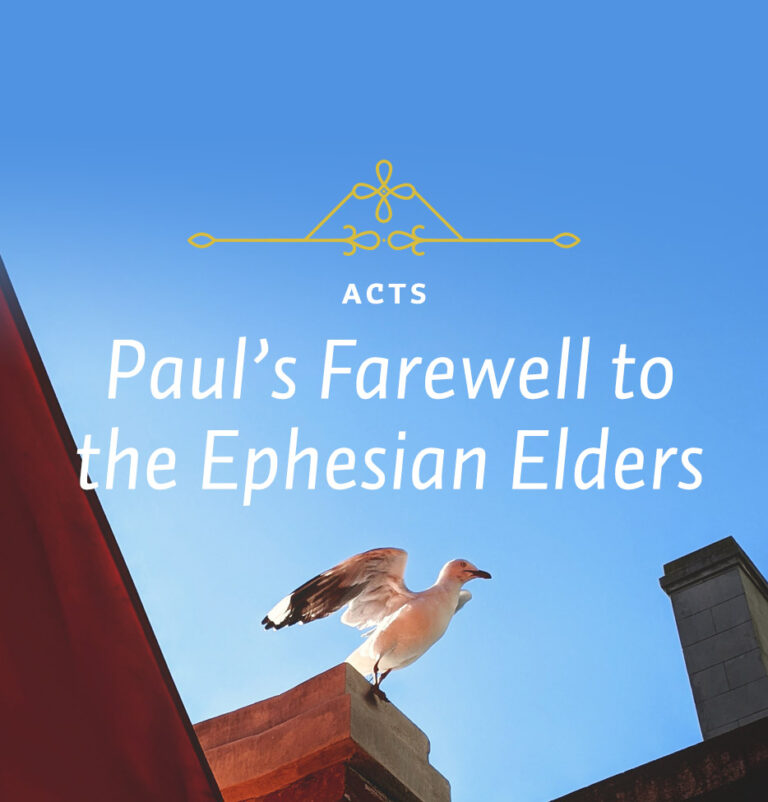
To anybody who has an interest in Paul as a person, the twentieth chapter of Acts is a delight. This is because we see him in two different but very important lights. We see him in public at Troas, leading the worship of the church. Then we see him in a private setting, meeting with the Ephesian elders at Miletus, a little town about twenty or thirty miles south of the Asian capital. The section is known as “Paul’s farewell to the Ephesian elders,” and it has three parts. The first concerns Paul himself. It contains Paul’s personal testimony before the elders. The second part is his specific charge to them. Finally, at the very end of the chapter and in much briefer language, we have a reference to his prayer on their behalf.

The second thing Paul says about himself in his testimony before the Ephesian elders is that, as he served among them with humility, he also did so with tears. Paul mentions this twice in the chapter. It is in verse 19, but you also find it in verse 31: “Remember that for three years I never stopped warning each of you night and day with tears.” Obviously this was something of considerable importance to him, though, as far as I know, this too is not referred to elsewhere.

Not only did Paul minister humbly and with tears, and not only was he diligent in his preaching, but he also had a proper set of priorities (v. 24). He told the elders, “I consider my life worth nothing to me, if only I may finish the race and complete the task the Lord Jesus has given me—the task of testifying to the gospel of God’s grace.”

The second part of Acts 20:13-38 is Paul’s charge to the elders. It is in verses 25-31. He puts it in different ways, but when we analyze what he is saying it boils down to one thing: “Keep watch over the flock within your charge.” He says, “Be diligent,” “Watch out for enemies,” “Take heed of wolves.” But basically he is telling them: “Keep watch over yourselves and all the flock of which the Holy Spirit has made you overseers” (v. 28).

How do you conclude a study like this, a farewell in which the Apostle Paul gave his personal testimony, charged those he was leaving behind, and prayed for them? I think there is a suggestion of a way to conclude in verse 32, where Paul speaks of “an inheritance” that God has prepared for His people.

Acts 27 contains the account of a great storm on the Mediterranean that overtook the ship that was bearing Paul to Rome. It was a literal storm, of course, but it can also be a symbol of the storms that come into the lives of Christian people. This is a splendid chapter, for it is one of those rare glimpses into a part of ancient life that you just do not find anywhere else.

The little company did the best they could, eventually making their way around the coast to the town of Myra in Lycia. Yet this was still on the southern edge of Asia and not very far along at all. They changed ships there, switching to a larger Alexandrian ship. The smaller ship would presumably continue on around the coast of Asia while the larger ship moved more directly westward over the open sea.

The story tells how the originally gentle breeze turned into a great Mediterranean storm that caused the winds and waves to rage day after day in a terrifying fashion. As Luke tells the story, there was a period of fourteen days in which the men did not see the sun or even the stars. Luke says, “When neither sun nor stars appeared for many days and the storm continued raging, we finally gave up all hope of being saved” (v. 20).

Christians testify that God has been with them in a way that is supernatural. God has quieted their hearts. He has made Himself known in small ways but which in the situation were so significant that the individuals could testify afterward that God did what He did just to reassure them. He taught them that He had a purpose in it all. Do you know that God is with you? Are you aware of His presence? When the storms come, that will make a great difference.

In yesterday’s study we saw how Paul responded to the storm that had overtaken him. We’ve already noted that 1) Paul knew that God was with him; and 2) Paul knew that he belonged to God. In today’s lesson we look at a third and fourth response.
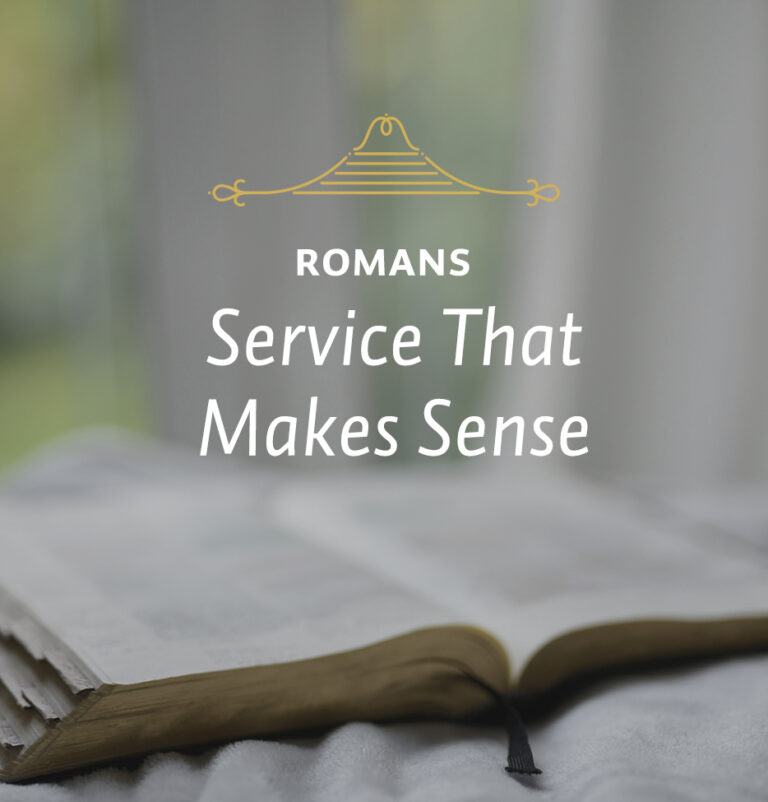
Today we come to the last phrase of Romans 12:1. The Greek words of this phrase are ambiguous, and can therefore be translated more than one way.

To understand this verse well we must understand the kind of service that is required. We have already spent a good bit of time exploring what this kind of service is about. It concerns what Paul calls “sacrifice.” When we were looking at it in detail earlier we saw that it involves three things.

God intervenes to save us by the work of Jesus Christ who died for us, and by the work of the Holy Spirit who enables us to understand what Jesus has accomplished, repent of our sin, and trust Him for our salvation. Then He has also joined us to Jesus Christ to make us different people from what we were before.

Let me make what I have been saying personal. Are you a believer in Jesus Christ? Are you trusting Him for your salvation? Has the Holy Spirit made you alive in Jesus Christ? If he has, what can be more reasonable than to give yourself to Him? What is more logical than to serve God wholeheartedly in this way?

It is reasonable because God is worthy of our very best efforts. In the fourth chapter of Revelation we read, “You are worthy, our Lord and God, to receive glory and honor and power, for you created all things, and by your will they were created and have their being” (Rev. 4:11).

Canadian Committee of The Bible Study Hour
PO Box 24087, RPO Josephine
North Bay, ON, P1B 0C7